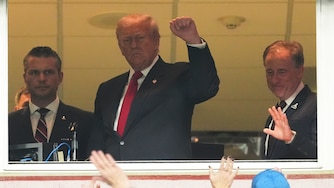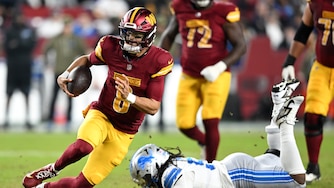Two years ago, Maryland began a years-long effort to phase out sales of gas-powered vehicles, part of its fight against climate change. Now it might become the first state in a national coalition to ease the pressure on car companies to electrify.
Under the Maryland program, part of the California-led Clean Cars II emissions standards, nearly half of new cars that roll off dealership lots need to be electric by the fall of 2026 or auto manufacturers could face fines.
At the moment, that target looks like a tailpipe dream.
Barely 13% of new car sales in Maryland were electric last year, while the overwhelming majority remained gasoline-fired, whose exhaust contributes to global warming.
Under current law, manufacturers whose sales aren’t at least 43% electric by model year 2027 and 51% by 2028 — through a combination of actual sales and purchased carbon credits — will face fines.
But with less than two weeks in the General Assembly session, lawmakers are considering a bill to defer the first two years of financial penalties.
Tailpipe emissions are a leading source of greenhouse gases, and putting off the fines could be seen as backing down from the state’s ambitious green goals. Advocates worry that Maryland could be the first domino to fall in rolling clean car standards back.
Every state, including California, is behind. The car industry, meanwhile, argues that meeting the requirements in the next 16 months is all but impossible.
Peter Kitzmiller, president of the Maryland Automobile Dealers Association, said that if Maryland doesn’t relax its requirements, companies will cut the number of cars of all kinds they send to Maryland.
“This thing is gonna be a disaster if we don’t fix it,” he said.
So far the proposal has drawn little attention or discussion. A spokesperson for House Speaker Adrienne A. Jones, a Baltimore County Democrat, declined to comment on whether top lawmakers intend to push the bill, but it was voted out of subcommittee Wednesday and could be poised to move forward.
In a brief, uneventful hearing earlier this month, bill sponsor Del. Dana Stein argued that Maryland can use the extra two years to build more electric charging infrastructure.
“Let me start by saying I am a big fan of electric vehicles,” said Stein, an unexpected sponsor of the proposal as one of Annapolis’ most climate-forward lawmakers.
The Baltimore Democrat argued that enforcing the penalties wouldn’t lead to more electric car sales, and could push Marylanders to nearby states to purchase gas-powered cars if local dealers reduce stock.
But the attempt to punt the penalties has drawn opposition from climate groups like the state chapter of the Sierra Club. And some worry that if Maryland, a national leader on many climate policies, breaks rank, it could have cascading effects in other states.
“This is really, really nationally important,” said Craig Segall, a former top official with the California Air Resources Board who helped broker that state’s EV requirements with car companies.
The auto industry is likely trying to pick off states in the Clean Cars program one at a time, and Segall, who now works as an independent consultant, cautioned that “this will become a model if Maryland folds.”
There are numerous ways Maryland regulators can allow leniency and flexibility for manufacturers and dealers without punting the fines, said Segall, who argued that the state has more time to figure out adjustments than industry officials suggest.
State leaders are “putting down the stick way before they get the carrot,” he said.
If manufacturers can’t hit the yearly requirements, they can make up the difference by purchasing carbon credits from others that surpass the standard. Tesla, the most popular EV maker in the U.S., makes a substantial amount of money selling these.
Combinations of credits allow manufacturers flexibility in the early years of the program and could bring the target threshold for the first year of penalties down from 43% to 19%, according to figures shared by the Maryland Department of the Environment earlier in the session. Even so, since Teslas are the most popular EV on Maryland’s roads, the state’s 13% sales rate is skewed heavily by Elon Musk’s company.
An amendment added to Stein’s bill Wednesday night would maintain the fines, but only if the companies agree to be penalized. This could buy the companies and regulators time to renegotiate targets, Stein said, making compliance more likely.
Stein’s bill would also forgo penalties on smaller targets set for electric truck sales — vehicles as light as a Ford F-250 or as heavy as a tractor trailer — meant to supercharge electrification of commercial freight. During California’s first full year with the Clean Trucks Rule in place, the state saw a nearly 80% decrease in overall truck sales, Stein said.
There’s strong evidence to support that adopting the Clean Cars rule has led to higher EV sales, experts agree.
Though far from the target, Maryland’s 13% mark is still nearly double the national average, said Stuart Gardner, a former auto executive and current director of Generation 180, a clean-energy advocacy nonprofit.
“Those targets can be achieved — we just need more people to get more experience with EVs” to see how the cars fit into their lives, Gardner said.
Yet others say Maryland still doesn’t have the necessary EV charging network, pointing to misplaced, infrequent or broken chargers as reasons more people haven’t switched.
The reappraisal of the EV plan in Maryland also comes as President Donald Trump is attempting to wipe out the program entirely. The president is trying to revoke a waiver that has allowed California to set its own vehicle emissions standard, a move that could undermine the authority of other states in the Clean Cars program to enforce EV requirements.
At the same time, Trump has rolled back funding for a Biden-era program to help build more chargers and wants to eliminate a federal tax credit considered crucial to EV sales. Maryland offers its own excise tax credit, too, but funds are no longer available for the current fiscal year.
A spokesperson for the Maryland Department of the Environment, which enforces the state emissions standards, said the agency is reviewing the legislation. EV incentives and requirements have helped put 130,000 electric cars on Maryland roads, he said.
“It’s not like California woke up one day and just set these numbers,” said Josh Tulkin, director of Maryland’s chapter of the Sierra Club. “We don’t want states peeling off. We want states sticking together and figuring this out together.”
Kitzmiller said that auto companies don’t plan to pay fines or buy clean-car credits from their competitors, so their only option will be to cut the supply to Maryland dealers.
And he argued that the less-than-stellar EV adoption in Maryland is not for lack of industry enthusiasm. The options for electric cars have grown substantially in recent years, while the trade group’s 300 member dealerships have invested more than $100 million in electrification infrastructure over the last two years.
Maryland isn’t alone in considering ways to relax enforcement of the California standards, Kitzmiller said.
“While technically we would be the first state,” he said, “I guarantee you we won’t be the last one.”



Comments
Welcome to The Banner's subscriber-only commenting community. Please review our community guidelines.